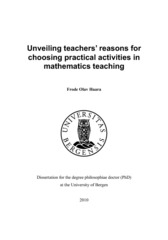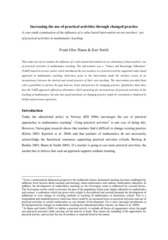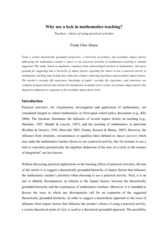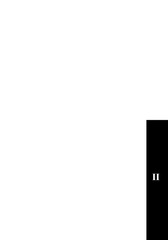| dc.contributor.author | Haara, Frode Olav | |
| dc.date.accessioned | 2011-08-29T08:58:25Z | |
| dc.date.available | 2011-08-29T08:58:25Z | |
| dc.date.issued | 2011-06-23 | eng |
| dc.identifier.isbn | 978-82-308-1783-4 | eng |
| dc.identifier.uri | https://hdl.handle.net/1956/4901 | |
| dc.description.abstract | The use of practical activities in mathematics teaching has been advocated for some time, and reports from mathematics classrooms show that teachers include a multitude of activities in the teaching of mathematics. However, research shows that a substantial portion of these practical activities are not well thought through and do not relate to other parts of the mathematics lessons. More knowledge is required about the reasons why teachers choose to use practical activities in mathematics teaching. The overall aim of this research project was to contribute to research-based knowledge about the inclusion of practical activities in mathematics teaching. This research project focused on the reasons why teachers include practical activities and identified some of the changes the teacher might make based on professional knowledge-based information when choosing practical activities. The theoretical foundation of the project concentrated on professional knowledge, beliefs and change in beliefs, and teacher identity. Shulman’s theory on teachers’ professional knowledge and Handal and Lauvås’s practice theory are linked with theories on beliefs and change in beliefs, and Sfard and Prusak’s theory on teacher identity. This has helped to identify a cluster of internal constraints that influence the teacher’s choice. Influence also stems from a cluster of external constraints. The project had a qualitative design that applied a hermeneutical approach to the collection and analysis of the data. A strategically selected group of eight teachers, considered acknowledged teachers of mathematics, was recruited, and each participated in two of three phases of data collection. During the last collection phase, data from a larger group of acknowledged teachers were also collected. The data were produced using multiple qualitative data production instruments, such as interviews, video recordings, written logs and an open-ended questionnaire. The research identified three categories of reasons why teachers choose practical activities: the importance of the teacher’s professional knowledge, compromises that the teacher feel obliged to make, and practical dilemmas that the teacher experience. The research also identified possible steps that can be taken to narrow the gap between actual and designated practice, and to choose practical activities for professional rather than practical reasons. The discussion and conclusions generate implications about how the choices of practical activities in mathematics teaching can be made to a greater extent for professional knowledge-based reasons and about the autonomous space for teaching that the teacher should have. | en_US |
| dc.language.iso | eng | eng |
| dc.publisher | The University of Bergen | eng |
| dc.relation.haspart | Paper I: Nordic Studies in Mathematics Education 14(3), Haara, F. O. & Smith, K., Practical activities in mathematics teaching-mathematics teachers’ knowledge based reasons, p. 33–54. Copyright 2009 Nationellt centrum för matematikutbildning. Full text not available in BORA due to publisher restrictions. The published version is available at: <a href="http://ncm.gu.se/pdf/nomad/14_3_033054_haara.pdf" target="blank">http://ncm.gu.se/pdf/nomad/14_3_033054_haara.pdf</a>. | eng |
| dc.relation.haspart | Paper II: Haara, F. O. & Smith, K., 2011, Increasing the use of practical activities through changed practice. A case-study examination of the influence of a value based intervention on two teachers’ use of practical activities in mathematics teaching. Submitted version. | eng |
| dc.relation.haspart | Paper III: Haara, F. O., 2011, Why use a leek in mathematics teaching? Teachers’ choice of using practical activities. Submitted version. | eng |
| dc.subject | Mathematics teaching | eng |
| dc.title | Unveiling teachers’ reasons for choosing practical activities in mathematics teaching | eng |
| dc.type | Doctoral thesis | |
| dc.rights.holder | Copyright the author. All rights reserved | |
| dc.subject.nsi | VDP::Social science: 200::Education: 280 | eng |



